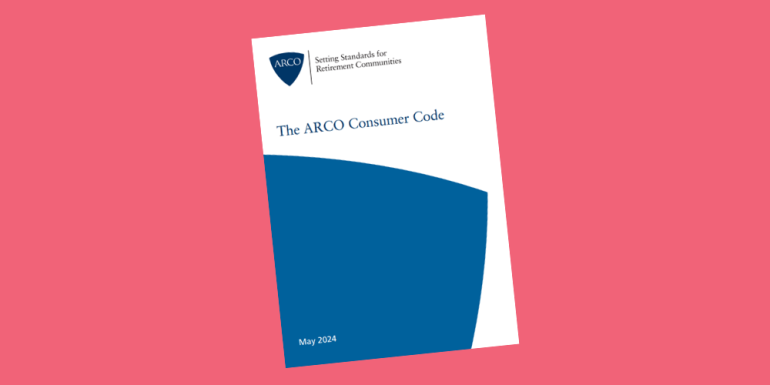Huge milestone for older people’s housing as industry code becomes first to secure Chartered Trading Standards Institute approval
ARCO, the national body for operators of Integrated Retirement Communities (IRCs) has secured CTSI approval for the ARCO Consumer Code, formally recognising its role in upholding customer service and consumer rights protection.
Following Stage 1 approval last year, the CTSI has given the ARCO Consumer Code stage 2 approval through its Approved Code scheme. This is the final stage of approval and marks the first time that a Consumer Code in older people’s housing has received approval by the CTSI.
The ARCO Consumer Code applies to ARCO member operators of IRCs in the UK and sets high standards for transparency in marketing and advertising, sales and lettings, and feedback and complaints handling. The Code helps to ensure that customers considering a move to an IRC are fully informed about the offer, prices, fees and charges and their consumer rights.
Now that the Consumer Code has been admitted to the CTSI’s Approved Code Scheme, ARCO has become a Code Sponsor, with its member operators becoming Code Members. This means that ARCO must continuously monitor its members’ adherence to the Consumer Code, and ARCO itself is now audited by the CTSI, ensuring high-level, independently monitored consumer protection.
Every ARCO Member is now entitled to display the Approved Code Logo in their premises, in their publicity materials, and on their website. This acts as both a meaningful badge of honour and a clear signal to customers that they are a trustworthy and dependable business that is genuinely committed to protecting enhanced consumer rights.
The ARCO Consumer Code builds upon UK consumer law to set specific, high standards for the Integrated Retirement Community sector and to protect customers and residents from misleading advertising, high-pressure sales, and other “sharp” practices. It is informed by regular assessments of ARCO Members and by external developments, such as the work of the Law Commission for England and Wales on event fees in retirement properties. The Code also provides a route for independent Alternative Dispute Resolution (ADR) for consumer complaints under the Code, provided by The Property Ombudsman.
Adherence to the ARCO Consumer Code is overseen by ARCO’s Standards Committee, which is independently chaired.
Sally Ireland, Director of Legal and Compliance at ARCO, said:
“This approval signifies that the ARCO Consumer Code operates to ensure the highest standards of consumer protection. We hope that this approval helps to further ease peace of mind for those wanting to move into an ARCO Member scheme, knowing that high regulatory standards and consumer protections are in place.”
Michael Voges, Chief Executive of ARCO, said:
“I am delighted that ARCO’s Consumer Code has received full approval under the CTSI Approved Codes Scheme. This is a huge milestone in the growth of the IRC sector. ARCO is committed to setting and driving high standards in older people’s housing-with-care, and this approval is testament to the hard work of ARCO’s Standards Committee and Members who have worked together to achieve this and ensure strong consumer protection in the sector.”
Jessica Merryfield, Head of Policy and Campaigns at CTSI, said:
“ARCO have signalled their intent to ensure consumers have confidence that their best interests are being protected by becoming an Approved Code Sponsor. We are delighted that ARCO has taken that step and we welcome them to the Approved Code Sponsor Scheme.”
NOTES TO EDITORS
ARCO
- ARCO (Associated Retirement Community Operators) is the national body representing charity, not-for-profit and private operators of IRCs in the UK. ARCO sets standards for the sector and representing the interests of members at a national level.
- Integrated Retirement Communities (IRCs), sometimes known as ‘housing-with-care’, sit between mainstream housing and residential care. The key features of an Integrated Retirement Community are:
- Every resident has their own front door, kitchen and bathroom
- 24/7 onsite support
- Extensive shared facilities - frequently including lounges, restaurants, gyms, hairdressers, shops and other leisure facilities
- Optional, onsite care and support services are designed to support older people to live independently for as long as possible.
- The ARCO Consumer Code applies to Integrated Retirement Communities in the UK that have been registered with ARCO, by ARCO Approved Operators, as well as Provisional and Prospective members of ARCO. ARCO Approved Operators agree to abide by the Consumer Code and the Standards and Compliance Framework. ARCO membership, therefore, means that the Integrated Retirement Community operator has agreed to go beyond the legal requirements to ensure transparency in its marketing and sales practices, providing information on fees and charges to customers promptly. The Code also sets the core levels of service provision for ARCO Members and requires operators to treat consumers fairly.
- Approved Operators are regularly assessed by ARCO to ensure that high standards are maintained. In addition, ARCO supports Members to achieve compliance by providing workshops, training, and guidance materials. Customers and Residents who believe that an Approved Operator has not complied with the Consumer Code and who have gone through the Operator's complaints process can access Alternative Dispute Resolution (ADR) under the Code, using the independent service provided by the Property Ombudsman.
- ARCO’s Standards and Regulation functions are overseen by the independently chaired ARCO Standards Committee . The Committee confers Approved Operator status on Members who have achieved compliance and works to promote high standards across the ARCO membership. The Standards Committee is responsible for overseeing the ARCO Standards programme and for the award of Approved Operator status, which shows that an operator has successfully been successfully assessed under the Consumer Code. In the event of a serious breach of the Code, the Committee has the power to issue a range of sanctions up to and including removal of Approved Operator status (meaning that the organisation could no longer be a member of ARCO).
About the CTSI
CTSI is a professional association which represents and trains trading standards professionals working in local authorities, business and consumer sectors and in central government in the UK.
About The Property Ombudsman
The Property Ombudsman offers an independent and impartial dispute resolution service to consumers who have been unable to resolve their disputes with a registered property business. The scheme was established in 1990. The Ombudsman can provide redress to place the consumer back in the position they were before the complaint arose, achieving a full and final settlement of the dispute and all claims made by either party. Where appropriate, the Ombudsman can make a range of directions to put the consumer back in the position they would have been in but for the shortcomings of a registered agent. This may include awarding compensation for aggravation, distress or inconvenience and/or for financial loss.
A summary of the requirements for Approved Codes is below:
Approved Code Summary
- No 'Sharp' Practices : Code Member businesses should have measures in place to tackle any undesirable trade practices.
- Trained Staff : They should ensure that their staff are familiar with - and understand - their Code of Practice.
- No Misleading Advertising : They must provide protections against misleading advertising (by requiring that Approved Codes comply with all relevant Consumer Protection Codes and Legislation).
- Up-Front and Unambiguous : They must give consumers access to clear Pre-Contractual Information in Writing (e.g. the details about a business, a customer's cancellation rights, and any payments or charges).
- Customer Respect : Code Member businesses must Respect the Sanctity of Consumers' Home - complying with their wishes not to receive unsolicited visits, canvassing, mailshots or phone calls.
- High-Pressure Sales Practices : They should never use high-pressure selling tactics, which are likely to disadvantage consumers - particularly those who are susceptible to such selling techniques or vulnerable in other ways.
- Honest and True : They should provide consumers with clear Terms and Conditions and fair Contracts (in full compliance with the 2015 Consumer Rights Act).
- Convenient and Flexible : They should offer consumers flexibility on delivery dates and times, or when agreeing completion dates. And they should have suitable arrangements in place if there are delays.
- Basic Consumer Rights : They must ensure that consumers understand their basic rights, including their Cancellation Rights.
- Guarantees and Warranties : They must ensure that consumers understand all the Guarantees and Warranties that apply – and how these differ from standard consumer rights, and the cost of additional/optional guarantees and warranties.
- Payment Protection : They should ensure that a clients' money, deposits or pre-payments are protected.
- High-Levels of Customer Service : And, finally, they should provide consumers with friendly and effective Customer Service, offering additional help to susceptible consumers (e.g. those with poor literacy skills, or people with disabilities).





